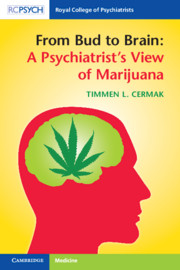Book contents
- From Bud to Brain: A Psychiatrist’s View of Marijuana
- From Bud to Brain: A Psychiatrist’s View of Marijuana
- Copyright page
- Dedication
- Contents
- Foreword
- Acknowledgments
- Introduction
- Section 1 The Science of Marijuana and the Brain
- Chapter 1 Monumental Marijuana Discoveries
- Chapter 2 Marijuana’s Acute Effects
- Chapter 3 Flies in the Ointment
- Chapter 4 Epidemiology
- Chapter 5 The Impacts of Ongoing Marijuana Use on the Brain
- Chapter 6 The Impacts of Ongoing Marijuana Use on the Mind: Section 1
- Chapter 7 The Impacts of Ongoing Marijuana Use on the Mind: Section 2
- Chapter 8 The Impacts of Ongoing Marijuana Use on Adolescent Psychology
- Chapter 9 Secondhand Marijuana: Prenatal Cannabis Exposure
- Section 2 The Science and Art of Healing
- Section 3 The History and Art of Marijuana Policy
- Section 4 Epilogue
- Index
Chapter 3 - Flies in the Ointment
Cannabinoid Deficiency and the Reality of Addiction
from Section 1 - The Science of Marijuana and the Brain
Published online by Cambridge University Press: 31 March 2020
- From Bud to Brain: A Psychiatrist’s View of Marijuana
- From Bud to Brain: A Psychiatrist’s View of Marijuana
- Copyright page
- Dedication
- Contents
- Foreword
- Acknowledgments
- Introduction
- Section 1 The Science of Marijuana and the Brain
- Chapter 1 Monumental Marijuana Discoveries
- Chapter 2 Marijuana’s Acute Effects
- Chapter 3 Flies in the Ointment
- Chapter 4 Epidemiology
- Chapter 5 The Impacts of Ongoing Marijuana Use on the Brain
- Chapter 6 The Impacts of Ongoing Marijuana Use on the Mind: Section 1
- Chapter 7 The Impacts of Ongoing Marijuana Use on the Mind: Section 2
- Chapter 8 The Impacts of Ongoing Marijuana Use on Adolescent Psychology
- Chapter 9 Secondhand Marijuana: Prenatal Cannabis Exposure
- Section 2 The Science and Art of Healing
- Section 3 The History and Art of Marijuana Policy
- Section 4 Epilogue
- Index
Summary
The topic of marijuana addiction is emotionally charged. The two aspects of addiction—withdrawal symptoms unique to marijuana and alterations in the brain’s reward mechanism common to all addictive drugs—must be approached separately. THC’s stimulation of CB1 receptors causes a homeostatic reduction of receptor density, called downregulation. When THC stimulation wanes, the resultant relative lack of receptors leads to a transient deficiency of endocannabinoid activity. Hirnoven found a 20% reduction in endocannabinoid receptors in the cortex of individuals regularly using marijuana requiring 4 weeks of abstinence to be reversed. The effects of cannabinoid deficiency outlined by Budney include withdrawal symptoms of restlessness, anxiety, insomnia, boredom and irritability. Relapse to marijuana use often occurs to abort withdrawal symptoms. The influx of dopamine in the reward center (nucleus accumbens) caused by excessive cannabinoid stimulation is the sine qua non for addiction and leads to a neurologically based increase in the salience of marijuana. Modification of reward mechanisms increases the motivation to use marijuana to the point that cognitive rationality is clouded and denial is produced.
- Type
- Chapter
- Information
- From Bud to Brain: A Psychiatrist's View of Marijuana , pp. 30 - 44Publisher: Cambridge University PressPrint publication year: 2020



